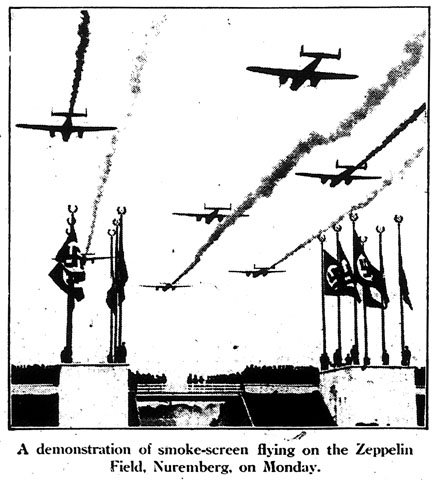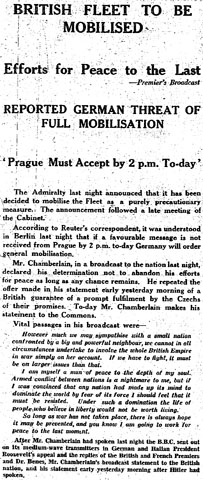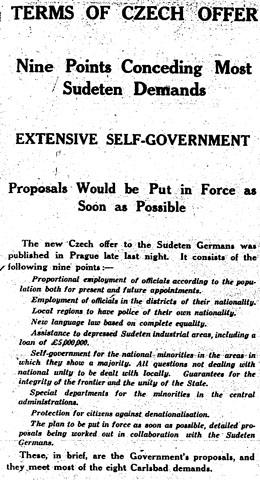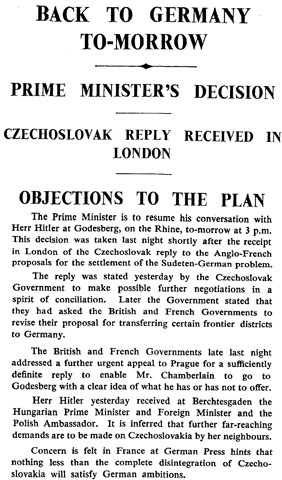
Ultimatum … martial law … 12 dead. These are not good words to be reading in the headlines (Manchester Guardian, p. 9). Yesterday, Hitler’s Nuremberg speech was interpreted as being somewhat worrying, but basically OK: after all, it could have been worse. But in the Sudetenland itself, it led to rioting, and the deaths of at least 12 people. Therefore the Czech government imposed martial law. In response, Henlein, the leader of the Sudeten German Party, demanded that martial law be withdrawn by midnight. Of course the Czechs refused to bow to such a peremptory demand from one of its own citizens, and so Henlein broke off negotiations once more. The Runciman mission is on the move again, trying to get people to talk to each other again, but it’s not looking good. As the leading article says (p. 8):
Events have moved with a terrible rapidity in Czecho-Slovakia since Herr Hitler’s speech and have now reached a grave crisis.
It ends by saying that the situation can still be saved, if Hitler and the Sudetens want to:
But is compromise desired? Is there a will to peace? The British Government, for its part, must remember that it will have to convince its own people, and other peoples, that up to the last minute of the last hour it did the utmost that it could, by appeal and by warning to Berlin, to avert catastrophe.
The ‘incidents’ are very serious. They include (p. 9):
Falkenau. — Three gendarmes killed by shots fired by Sudetens.
Aussig. — Two Sudetens and one Czech killed. Three other people killed; nationality not stated.
Eger. — One Czech killed.
Eringseilen. — Czech postmaster died of injuries caused by Sudetens.
So, despite the howling of the German press and government that the Sudeten people are not safe, more Czechs than Germans have been killed. For their part, the Sudetens claim that Czech officials fired upon them without provocation.
All this news came after trading on City markets had finished, but Wall Street was not so lucky (p. 12). The ultimatum led to falls of up to 3% across the board:
More than a million shares were sold in the last hour, the tape-machine falling five minutes behind transactions.
In London, the ‘inner Cabinet’ met: Chamberlain, Halifax, Hoare and Simon (Prime Minister, Foreign Secretary, Home Secretary, Chancellor of the Exchequer). Perhaps more worrying is who they were meeting: Sir Thomas Inskip, Minister for the Co-ordination of Defence, Duff Cooper, First Lord of the Admiralty, Sir Kingsley Wood, Air Minister, Hore-Belisha, War Minister. And Lord Gort, Chief of the Imperial General Staff, Air Marshal Sir Cyril Newall, Chief of Air Staff, and Admiral Sir Roger Backhouse, First Sea Lord and Chief of the Naval Staff. This kind of suggests that war might not be far off …

This photo of a Luftwaffe flypast (Do 17s?) at Nuremberg on Monday (p. 7) isn’t linked in any way to the Sudeten crisis.

Nor was this one of telephone operators in Sheffield wearing gas masks during an ARP drill, which was printed directly below the above. But at least some readers would have made a mental connection between these images and the worsening crisis in central Europe.
![]() This work is licensed under a Creative Commons Attribution-NonCommercial-NoDerivatives 4.0 International License.
Permissions beyond the scope of this license may be available at http://airminded.org/copyright/.
This work is licensed under a Creative Commons Attribution-NonCommercial-NoDerivatives 4.0 International License.
Permissions beyond the scope of this license may be available at http://airminded.org/copyright/.




Just taking this opportunity to jump in and say how much I appreciate your Sudeten-crisis post-blogging. I’m by no means an expert on any of the historical or aeronautical topics, but I am an amateur student of international relations, and I’m having a ball.
This is a pretty cool project. Munich isn’t my bag –I’m more into the industrial side of strategy– but it’s hard to beat day by day development to see what was really happening in people’s minds in a crisis like this.
Thanks! After a long buildup, we’re starting to get to the pointy end of the crisis, so things will be getting even more interesting …
Pingback: Airminded · Friday, 16 September 1938
Just backing up U Garlic here, Brett.
And I hope that “Sudeten Ultimatum” head didn’t come from The Times. Heaven’s, you’d never see such frivolous sub-editing nowadays.
But yet, another great band name.
And I can’t help wondering what’s going on with that smokescreen pic: ‘We are ze awfully zerious und methodical Germans. Ze aircraft are here. Just follow ze smoke. Ve dare you to shoot us down’? (FX: Evil laughter follows).
I think somebody from the Kriegsmarine must have somehow wangled a commission.
No, that headline was from the Grauniad, so they were probably just happy there were no typos. (Actually, that’s a cheap shot: there was nothing wrong with the Guardian’s proof-reading at this time. Spell-checking technology must have degraded over the next few decades …)
Not sure about the utility of the smokescreen either. I assume it’s meant to shield troops, but there must have been better ways to do that, and I can’t think of any time it was ever done. (Which almost certainly means there was such a time!)